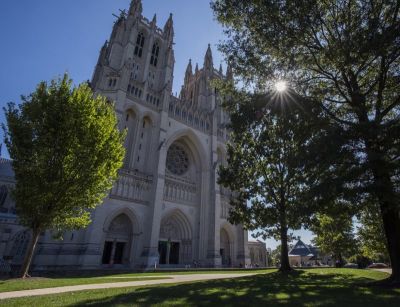Post-denominational America

American denominationalism is fading. Non-denominationals are now the largest non-Catholic religious group in America. Nearly all denominations are declining. Liberal ones are declining faster than conservative ones. Nearly all growing congregations are non-denominational.
What is the impact on American society?
We at IRD have across over 40 years mostly focused on denominations. From the start in 1981 we have been ecumenical, including Mainline Protestants, Evangelicals, Roman Catholics and Eastern Orthodox. We critiqued the National Council of Churches and the World Council of Churches, which are mostly comprised of Mainline denominations. We sometimes collaborated with and sometimes critiqued the National Association of Evangelicals, which is mostly comprised of denominations, although congregations and parachurch groups can join.
For many people, IRD is mostly associated with Mainline Protestantism. Critiquing its political witness and working for its reform was a big part of our work. We had special renewal projects for United Methodists, Episcopalians, and Presbyterians (PCUSA) that focused on the legislation at their governing conventions. Eventually, in the early and mid 2000s, traditionalists lost their battles in these denominations and either left, created new denominations, or yielded to the new reality. The exception was United Methodism, where traditionalists never legislatively lost, but who are now exiting, mostly for a new denomination, realizing the U.S. part of the global denomination is unfixable.
The new denominations that emerged from Mainline Protestantism are lean, don’t have bureaucracies, and themselves reflect in many ways America’s post denominationalism. Perhaps America has only one remaining “great” denomination, which is the Southern Baptist Convention. A “great” denomination is national, has millions of members, has universities and colleges, seminaries, publishing houses, journals, and transgenerational brand loyalty. But the Southern Baptist Convention is annually losing hundreds of thousands of members. Many of its most successful congregations now disguise their denominational tie. And even many ardent church members no longer relate strongly to the denominational brand. They and their children move seamlessly among evangelical congregations. Many if not most nondenominational churches are effectively Baptist in theology and polity, governed congregationally, through elders, and practicing believer’s baptism.
There are some growing denominations, such as the Assemblies of God, which is Pentecostal and very multiethnic. But its adherents don’t necessarily strongly identify with the denomination. They regard themselves as Christians, or maybe as Pentecostals, who relate to their congregation but give little thought to their denomination, if they are even aware of it. Why should church goers think much about their denominations if their clergy don’t talk a lot about them, if they are not going to denominational gatherings, if they are not attending denominational schools, if they are not reading denominational literature, and if there are no major denominational leaders with high profiles?
The decline of American denominationalism is sad in many ways. The Mainline Protestant denominations, with the Baptists and a few others, have been the pillars of American religion and for much of American civil society since the beginning of our republic. All successful movements and communities ultimately need multigenerational institutions to sustain and transmit their message. Christianity, if orthodox, cannot be divorced from institutions.
But the decline of American denominations does not necessarily herald the decline of American Christianity. Most of today’s denominations emerged from the ferment of the Second Great Awakening, or were breakoffs from those denominations, or emerged from the Holiness and Pentecostal revivals of the late 19th and early 20th centuries. The rise of post-WWII evangelicalism generated a new wave of denominational activity, although much of the action emanated from independent parachurch ministries, contributing to our current post-denominational times.
Such evangelical entrepreneurship, expressed through radio, television, schools, and other independent missions, helped dethrone the centrality of denominations. But so too did the failures of denominations. Mainline Protestant structures were liberalized in the early 20th century, became hostile to populist piety, and began their irreversible membership plunge in the 1960s. Conservative denominations initially benefitted from post-WWII evangelical resurgence but eventually, over the last 20 years, suffered from evangelicalism’s frequent indifference to tradition and ecclesiology. From the evangelical perspective, focused on individual conversion and experience, why were denominations needed? Weren’t they actually a distraction?
Irrespective of denominational failures, nearly all human institutions have a limited shelf-life. None of the Protestant denominations claim a permanent authority like Roman Catholicism. They were all born in particular cultural contexts, which all evolve with time. Schism, growth, sclerosis, mergers, decline and death are part of the rhythm of Protestant denominationalism.
For contemporary American Christianity, national religious institutions with large bureaucracies, strong brand loyalty, famous leaders, and a self-sustaining subculture are deemed not very relevant. Of course, aspects of the old denominationalism will continue. Many Southern Baptist seminaries are quite strong and will produce clergy for post denominational America. And many denominations will survive on a much smaller scale, with very lean structures, and often deemphasizing their denominational brands. In their place, there will be growing congregationalism attenuated by informal church networks. Christians, individually and congregationally, will rely on online resources that are not specific to any denominational traditions.
While the importance of denominations and their structures decline, the traditions that birthed them will not. Lutheranism, Calvinism, Anglicanism, Wesleyanism, Restorationism, and various flavors of Baptists, will continue and often will thrive in America, if not always carefully stewarded by denominations. And while post-denominational, contemporary populist piety will always thrive, behind it there will always be more rigorous outlines of orthodox Protestant theology providing some ballast.
For IRD, whose mission is to shape Christian political witness that strengthens democracy, the task is in some ways more complex. Christians no longer look to centralized structures and prominent church leaders for guidance for societal guidance, if they ever really did. Their sources of reference and authority are now defused across a swirling ocean of websites, independent publishers, social media, parachurch groups, and new schools. In this mix are every form of horrors and virtues.
Reaching individual Christians is now easier. There are no more denominational filters. IRD publishes online materials, host talks and conferences, and organizes hard copy books. We strive to reach Christians who are particularly concerned about principled Christian political witness rooted in permanence and tradition. The great Protestant traditions, if not the old denominations, remain our reference, supplemented by Catholic teaching and other historic Christian frameworks.
Ultimately, American Christianity will shift and reorganize in ways that best serve American Christians and other spiritual seekers. It may appear messy and disconcerting. Much of the old Christianity is dying. But new forms of Christian vibrancy are emerging.
American Christianity has always been entrepreneurial and adaptable. Its transitions may often look like decline. But often they are preambles to new spurts of growth and the creation of new institutions. These evolutions are intrinsic to Protestantism, especially in America, a nation whose churning restlessness is rooted in the endless Protestant quest for improvement.
Originally published at Juicy Ecumenism.
Mark Tooley became president of the Institute on Religion and Democracy (IRD) in 2009. He joined IRD in 1994 to found its United Methodist committee (UMAction). He is also editor of IRD’s foreign policy and national security journal, Providence.




























